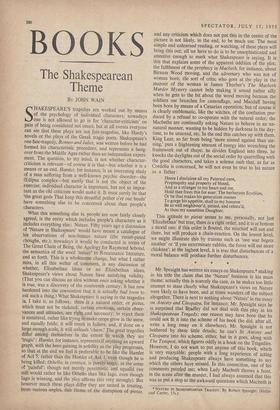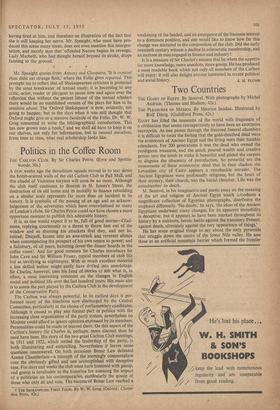BOOKS
The Shakespearean Theme
BY JOHN WAIN SHAKESPEARE'S tragedies are worked out- by means of the psychology of individual characters; nowadays one is not allowed to go in for 'character-criticism' on pain of being considered not smart, but at all events everyone can see that these plays are not fate-tragedies, like Hardy's novels or the plays of the Greek tragic poets. Shakespeare's one fate-tragedy, Romeo and Juliet, was written before he had formed his characteristic procedure, and represents a hang- over from the Middle Ages rather than- an independent experi- ment. The question, to my mind, is not whether character- criticism is relevant—of course it is that—but whether it is a means or an end. Hamlet, for instance, is an interesting study of a man suffering from a well-known psychic disorder—the lidipus complex—but surely that is not the object of the exercise; individual character is important, but not so impor- tant as the old criticism would make it. It must surely be that 'the great gods That keep this dreadful pother o'er our heads' have something else to be concerned about than people's . characters.
What this something else is, people are now fairly closely agreed, is the entity which includes people's characters as it includes everything else: Nature. Fifty years ago a discussion of 'Nature in Shakespeare' would have meant a catalogue of his observations of non-human nature (the russet-pated choughs, etc.); nowadays it would be conducted in terms of The Great Chain of Being, the Apology for Raymond Sebond, the semantics of the word 'nature' in Renaissance literature, and so forth. This is a wholesome change, but what I rather miss. in all this welter of comment, is any discussion of whether, Elizabethan ideas or no Elizabethan ideas, Shakespeare's views about Nature have satisfying validity. (That you can discuss an idea without once asking whether it is true, was a discovery of the nineteenth century; it has now hardened into the convention that it is actually bad form to ask such a thing.) What Shakespeare is saying in the tragedies is, I take it, as follows : there is a natural order, or pietas, which must not be violated; certain emotions, certain obser- vances and attitudes, are right and necessary; to reject them is unnatural, rather like trying tb make crops grow in the snow, and equally futile; it will result in failure, and, if done on a large enough scale, it will unleash 'chaos.' The great tragedies diffei among themselves in the extent to which they are 'tragic' : Hamlet, for instance, represents if anything an upward graph, with the hero gaining in nobility as the play progresses, so that at the end we feel it preferable to be like the Hamlet of Act 5, rather than the Hamlet of Act 1, even though he is being killed; Othello, in contrast, is purely tragic, in the sense of 'painful'; though not merely pessimistic and squalid (we still would rather be like Othello than like Iago, even though Iago is winning, and the play affirms this very strongly). But however much these plays differ they are united in treating, from various angles, this theme of the disruption of pietas, and any criticism which does not put this in the centre of the picture is not likely, in the end, to be much use. The most simple and unlearned reading, or watching, of these plays will bring this out; all we have to do is to be unsophisticated and attentive enough to mark what Shakespeare is saying. It is this that explains some of the apparent oddities of the plot; the fulfilment of the prophecy in Macbeth, for instance, about Birnam Wood moving, and the adversary who was not of woman born; the sort of critic who goes at the play in the manner of the woman in James Thurber's The Macbeth Murder Mystery cannot help making it sound rather silly when he gets to the bit about the wood moving because the soldiers use branches for camouflage, and Macduff having been born by means of a Caesarian operation; but of course it is clearly emblematic, like the witches, of the confusion pro- duced by a refusal to co-operate with the natural order; the Macbeths are continually asking Nature to behave in an un- natural manner, wanting to be hidden by darkness in the day- time, to be unsexed, etc. In the end this catches up with them. King Lear, so far from being 'more sinned against than sin- ning,' puts a frightening amount of energy into wrenching the framework out of shape; he divides England into three, he knocks the daylights out of the social order by quarrelling with the good characters, and takes a solemn oath -that, as far as Cordelia is concerned, he will not even be true to his nature as a father: Heere I disclaime all my Paternal care, Propinquity and property of blood, And as a stranger to my heart and me, Hold thee from this for euer. The barbarous Scythian, Or he that makes his generation messes To gorge his appetite, shall to my bosome Be as well neighbour'd, pittied, and releeu'd, As thou my sometime Daughter.
This altitude to pietas seems to me, personally, not just 'Elizabethan' but true; there is a right order, and it is at bottom a moral one; if this order is flouted, the mischief will not end there, but will produce a chain-reaction. On the lowest level, we might illustrate this by truisms such as 'one war begets another' or 'if you exterminate rabbits, the foxes will eat more chickens'; at the highest level, it is true that disturbances of a moral balance will produce further disturbances.
* * * Mr. Speaight has written six essays on Shakespeare,* making in his title the claim that the 'Nature' business is his main theme; actually this is scarcely the case, as he makes too little attempt to state clearly what Shakespeare's views on Nature were likely to have been, and at times wanders off the subject altogether. There is next to nothing about 'Nature' in the essay on Antony and Cleopatra, for instance; Mr. Speaight says he is surprised that Bradley did not deal with this play in his Shakespearean Tragedy; one reason may have been that he could not fit it into the scheme of his book (he did, after all, write a long essay on it elsewhere): Mr. Speaight is not bothered by these little details; he can't fit Antony and Cleopatra into his scheme, either, but in it goes, along with The Tempest, which figures oddly in a book on the Tragedies. However, I do not want to put anyone off this book, which is very enjoyable; people with a long experience of acting and producing Shakespeare always have something to say which the others have missed. In this connection, one of his comments puzzled me; when Lady Macbeth throws a faint, in the scene after the murder, I had always assumed that this was to put a stop to the awkward questions which Macbeth is * NATURE IN SHAKESPEAREAN TRAGEDY. By Robert Speaight. (Hollis and Carter, 15s.) having fired at him, and therefore. an illustration of the fact that she is still keeping her nerve. Mr. Speaight, who must have pro- duced this scene many times, does not even mention this interpre- tation, and merely says that `offended Nature begins its revenge; Lady Macbeth, who had thought herself beyond its stroke, drops fainting to the ground.'
Mr. Spcaight quotes from Antony and Cleopatra, 'It is reputed thou didst eat strange flesh,' where the Folio gives reported. This prompts me to reflect that all Shakespearean criticism is protected by the stout breakwater of textual study; it is becoming to any critic, actor, reader or playgoer to pause now and again over the reflection that without the patient labour of the textual scholars there would be no established version of the plays for him to be sensitive about. The 'Oxford Shakespeare' is now, evidently, not going to happen; but in the days when it was still thought that Oxford might give us a massive facsimile of the Folio, Dr. W. W. Greg consented to write the bibliographical introduction. This has now grown into a book,t and we shall all have to keep it on our shelves, not only for information, but to remind ourselves, from time to time, what real scholarship looks like.



































 Previous page
Previous page